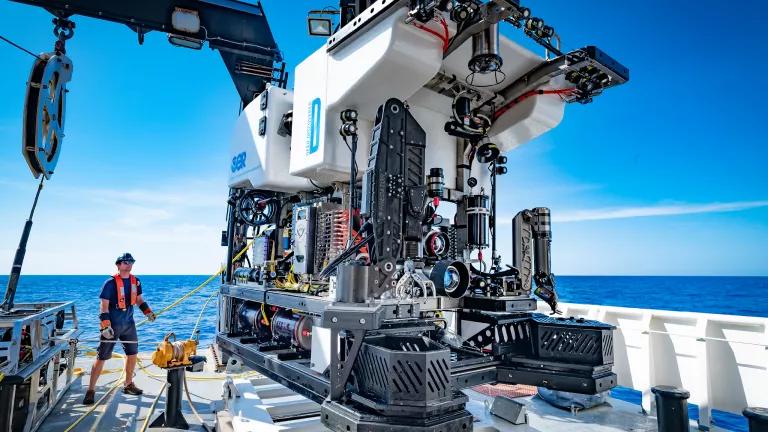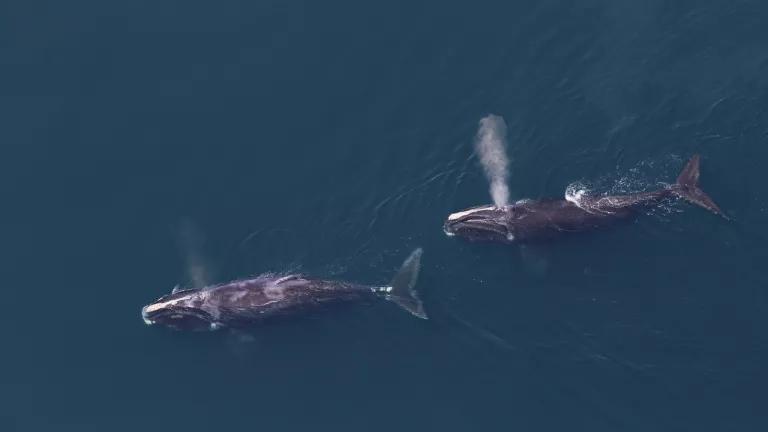
Big news! Sharks will continue to receive protection under California state law. The Ninth Circuit U.S. Court of Appeals just released an opinion upholding California's shark fin ban as constitutional and not preempted by federal law. This is the first time a U.S. appellate court has weighed in conclusively on the issue of state shark fin laws, and it's terrific to see the court coming down on the right side.
As you may know from my previous blog posts, California's shark fin ban was enacted in 2011 to end the consumption and trade of shark fins in the state, thereby weakening the market demand for fins and helping to protect shark populations.
Shortly after the fin ban was passed, shark fin traders and dealers sued to invalidate the law, claiming it discriminated against Chinese-Americans and was an invalid burden on commerce. They also tossed in an argument about preemption, claiming that California's law conflicted with the federal fishery management statute, the Magnuson-Stevens Act. While this argument was just an afterthought at the time the case was filed, after three years and various twists and turns, it ended up being the central issue in the case.
In yesterday's opinion, the Ninth Circuit panel splits, with Judges Hurwitz and Noonan in the majority, affirming the district court's dismissal of the case (and thereby upholding California's fin ban). Judge Reinhardt, writing in dissent, states that he would prefer to send the case back to the district court for further development. Yesterday's judgment should be the last word in the case, unless it goes to the Supreme Court or the Ninth Circuit revisits the issue en banc.
This is an important opinion, and I'm going to spend the rest of this (rather long) blog post parsing it. If that doesn't interest you, I recommend redirecting your attention to this important news story. Otherwise, here goes.
The majority basically gets all the key issues right. First, the opinion recognizes and reinforces the established legal principle that conservation is the primary purpose of the Magnuson-Stevens Act. While the court acknowledges that the Magnuson-Stevens Act (also known as the MSA) does have multiple purposes, the court states in no uncertain terms that conservation takes priority:
The MSA indeed recognizes various competing values. See 16 U.S.C. § 1801(b) (listing "conserv[ing] and manag[ing] the fishery resources found off the coasts of the United States," "promot[ing] domestic commercial and recreational fishing under sound conservation and management principles," and "encourag[ing] the development by the United States fishing industry of fisheries which are currently underutilized or not utilized . . . in a non-wasteful manner" as objectives of the MSA). Among [the various goals], however, conservation is paramount. See Nat. Res. Def. Council, Inc. v. Nat'l Marine Fisheries Serv., 421 F.3d 872, 879 (9th Cir. 2005) ("The purpose of the Act is clearly to give conservation of fisheries priority over short-term economic interests."); Daley, 209 F.3d at 753 ("[U]nder the . . . [MSA], the Service must give priority to conservation measures.").
This matters because a state law can be preempted when a federal law establishes a delicate balancing scheme, and the state action would risk disrupting the federal balance. Here, there is no delicate balance at risk of being upset, because conservation takes priority, so state laws furthering that goal are permissible. As stated by the majority:
This is . . . not the rare circumstance in which a state law interferes with a "deliberate effort to steer a middle path," Crosby v. Nat'l Foreign Trade Council, 530 U.S. 363, 378 (2000) (quotation marks omitted), or to strike a "careful balance," Arizona, 132 S. Ct. at 2505.
Second, the court correctly noted that the Magnuson-Stevens Act does not mandate a particular level of catch, and therefore state laws that incidentally affect the level of catch, or the economic calculus of fishing, do not necessarily interfere with the federal fisheries management system:
To be sure, the California statute restricts certain economically viable uses for sharks that are lawfully harvested from the EEZ and landed in California. But the MSA does not mandate that a given quantity of sharks be harvested from the EEZ--and even if it did, detached fins are not the only viable use for harvested sharks.
A more specific version of this same conclusion comes when the court discusses the management target in federal fisheries law, which is called "Optimum Yield." Optimum Yield is a decision-making tool for federal managers--essentially a way for managers to think about the amount of fishing that they want to allow. The Court correctly concludes that Optimum Yield should not be interpreted in an overly rigid way that could give rise to preemption:
[T]he MSA does not preempt a state law simply because it may affect the realization of optimum yields--if that were so, a wide array of state regulations affecting commercial fishing, such as taxes or labor laws, would be potentially suspect. Indeed, Congress expressly foreclosed any interpretation of optimum yield that would have such a broad preemptive effect by preserving state jurisdiction over commerce in fish products within state borders. See 16 U.S.C. § 1856(a)(1).
This is a crucial part of the opinion, as most of the arguments in favor of preemption have oriented around rigid views of Optimum Yield, or a more general notion that the MSA mandates catch of (and a market for) a specific amount of fish each year. These arguments are not well-founded, and it's useful to have a U.S. Court of Appeals opinion explicitly rejecting them.
Third, the majority distinguishes existing case law on preemption under the MSA, correctly noting that the instances where courts have found preemption are narrow and limited to fact patterns that show a direct conflict between state and federal law. One small hiccup in both majority and dissent is that the judges treat one of the Plaintiffs' main cases, Southeastern Fisheries Association v. Chiles, as good law, when that case was abrogated by Congress in the 1996 amendments to the Magnuson-Stevens Act. It would have been nice if the Ninth Circuit had clearly noted the questionable status of Chiles, but either way, this does not affect the analysis significantly.
Fourth, the majority concludes that no negative implication can be drawn from Congress's failure to regulate the on-land sale of shark fins. This is obvious to anyone who has dug into the legislative history of the Shark Conservation Act of 2010 and the Shark Finning Prohibition Act, but due to careless statements from the National Marine Fisheries Service, the idea that Congress somehow implicitly sanctioned the sale of shark fins by not regulating has been thrown around a lot lately. It's good to see this spurious argument squashed.
Finally, the majority points out that there is no conflict of methods between state and federal law (which is a different route for finding preemption), as the Magnuson-Stevens Act expressly creates a cooperative federal-state regulatory system. Again, this is not a hard conclusion to reach on one's own, but it helps to have a court state it explicitly.
Overall this is a solid opinion, written for the majority by Judge Hurwitz.
In his dissent, Judge Reinhardt demonstrates some fundamental misunderstandings about the law. Perhaps most importantly, he fails to apprehend that conservation is the primary goal of the Magnuson-Stevens Act. Despite clear structural arguments for reading the Act this way, and significant case law already establishing the primacy of conservation, Judge Reinhardt heads off in his own direction and asserts that the purpose of the Act is to maximize fishing. After the two rounds of amendments to the law in 1996 and 2006, this is simply wrong. Perhaps Judge Reinhardt, given his extremely long tenure on the bench, is recalling an older version of the statute.
The dissent also would interpret Optimum Yield rigidly, as prohibiting any action by a state that could affect catch levels in a federal fishery. This would lead to absurdity, with laws such as state fuel taxes and health and safety standards being struck down because they might affect catch levels in federal fisheries. And more generally, it reflects a misunderstanding of federal fishing quotas as amounts that must be caught, rather than as precautionary limits that catch must stay under.
At the end of his dissent, Judge Reinhardt signals what may be motivating him: a perceived lack of opportunity for the plaintiffs to have their arguments fully vetted. While Judge Reinhardt's charity is admirable, in this case it is misplaced. The plaintiffs have had over three years to flush out their arguments and any supporting facts, and prior to dismissing the case, the district court judge asked plaintiff's counsel directly whether he had any further ways he could amend his complaint to strengthen his claims. Everyone in the courtroom (your faithful author included) heard plaintiff's counsel reply in the negative, and concede that the existing complaint embodied the fullest possible allegations he could bring to bear. Judge Reinhardt reads the transcript of this exchange and finds ambiguity in the statement by plaintiffs' counsel--an ambiguity that did not exist in the room that day. While it's important to give everyone a chance to fully vet their claims in court, this case has dragged on long enough, and plaintiffs directly conceded that they had nothing further to offer. As such, it's appropriate to put the case to bed.
While it would have been nice to have a unanimous decision, the majority opinion in Chinatown Neighborhood Association vs. Harris is strong, and represents a real step forward. Here's a great white shark looking happy:




